Around 700 new spots could open in the next couple of years
VANCOUVER — Downtown Vancouver is booming. That’s a good thing. More jobs, better restaurants, and a growing list of activities. It also means finding a parking spot can, at times, be a nightmare.
“Parking is important in the downtown because people come downtown to have a unique experience that’s active and diverse. And a big part of that experience is parking,” said Chad Eiken, the city’s Community and Economic Development director at a recent city council work session. “And it’s usually their first and their last impression of that overall experience of coming to the downtown.”
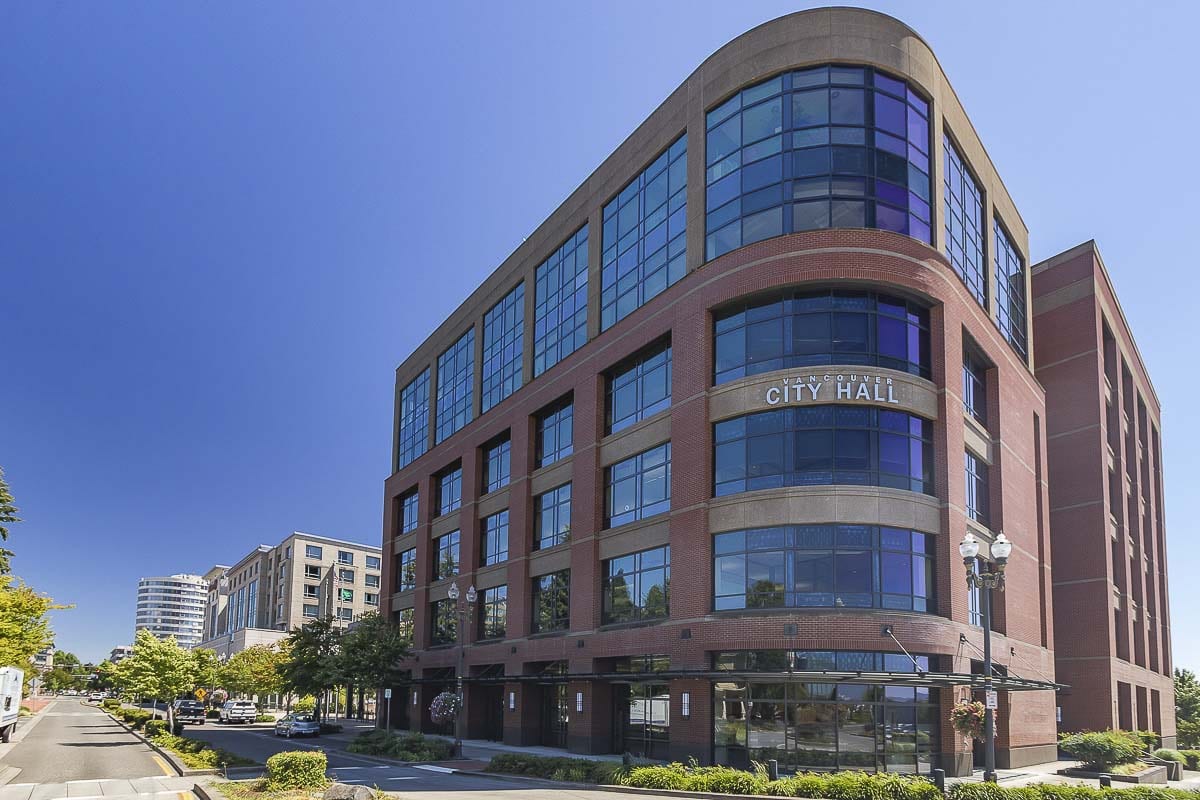
Eiken says there are approximately 1,200 city-owned parking spaces in two garages and four surface lots, along with around 3,600 regulated on-street spots. There are an estimated 8,500 privately owned spaces in garages or surface lots.
However, Eiken told the council, many of those privately owned surface lots are in the process of being redeveloped, and businesses are increasingly packing more employees into the same space, leading to growing constraints on the amount of available parking. There have also been at least 640 new apartment units downtown in the past four years. While those usually come with parking, they have frequently replaced surface parking lots and add up to a net loss of spots.
Monday’s meeting came on the heels of four other work sessions in front of city council over the past year or so. Eiken said their takeaway was that there is currently no parking crisis, but that the city needs to take action soon to avoid that. The other takeaway is that the city has no interest in building more parking garages or getting into the business of parking.
“The preference for is for maximizing the existing parking system through efficient management of our spaces, adding capacity where it’s possible,” said Eiken. “We heard from you that there is a general openness to public and private partnerships that build more parking with the priority on visitor parking.”
Short term solutions
In the short term, Eiken says the plan is to re-stripe some of the wider roads downtown to move from sidewalk parallel parking to angled spots. That is expected to add around 88 spots by late Summer or early Fall. That includes 50 total spots on West Evergreen Boulevard and nearby arterials, 22 on King Street, as well as eight spaces on West 13th near Main Street.
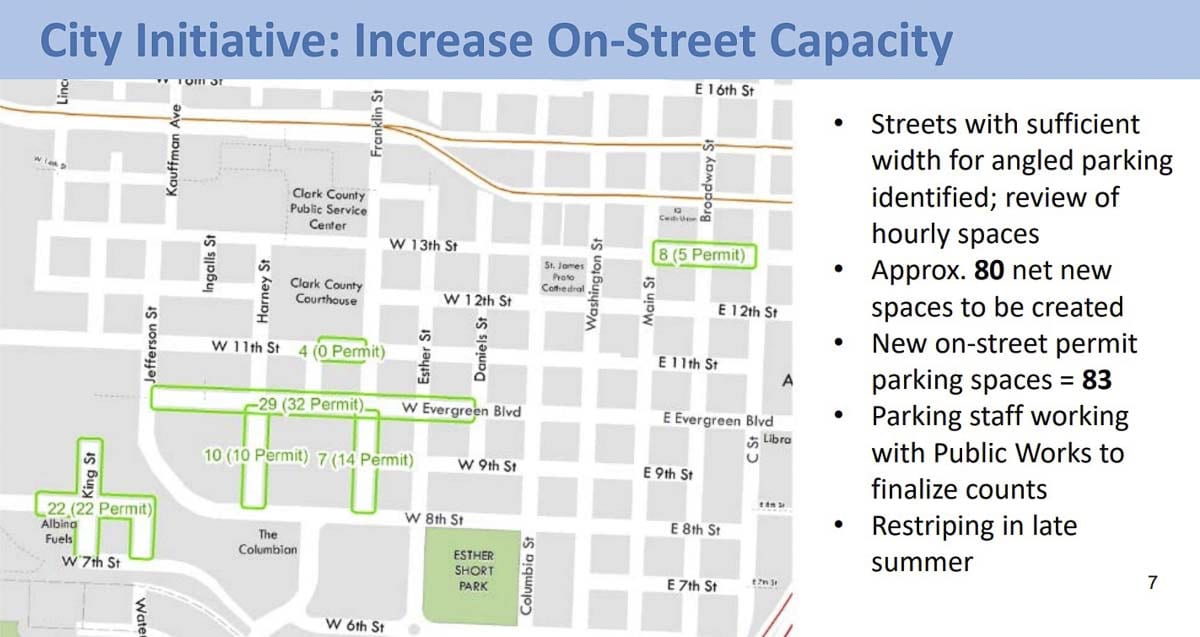
The city is also completing a new 121-space surface lot west of City Hall, which will move 23 city-owned vehicles out of the VancouverCenter parking garage, freeing up spaces for people on the waitlist.
Vancouver Parking Manager Steve Kaspan said there are also plans to increase monthly on-street parking permits from $60 to $65. Currently the $60 rate is two dollars cheaper than a monthly C-TRAN pass.
“One way of looking at what the market rate is, is if permit sales decline to the point where we have excess inventory then the price is too high,” Kaspan told the council. “If we have waiting lists — which we do — then the price is too low.”
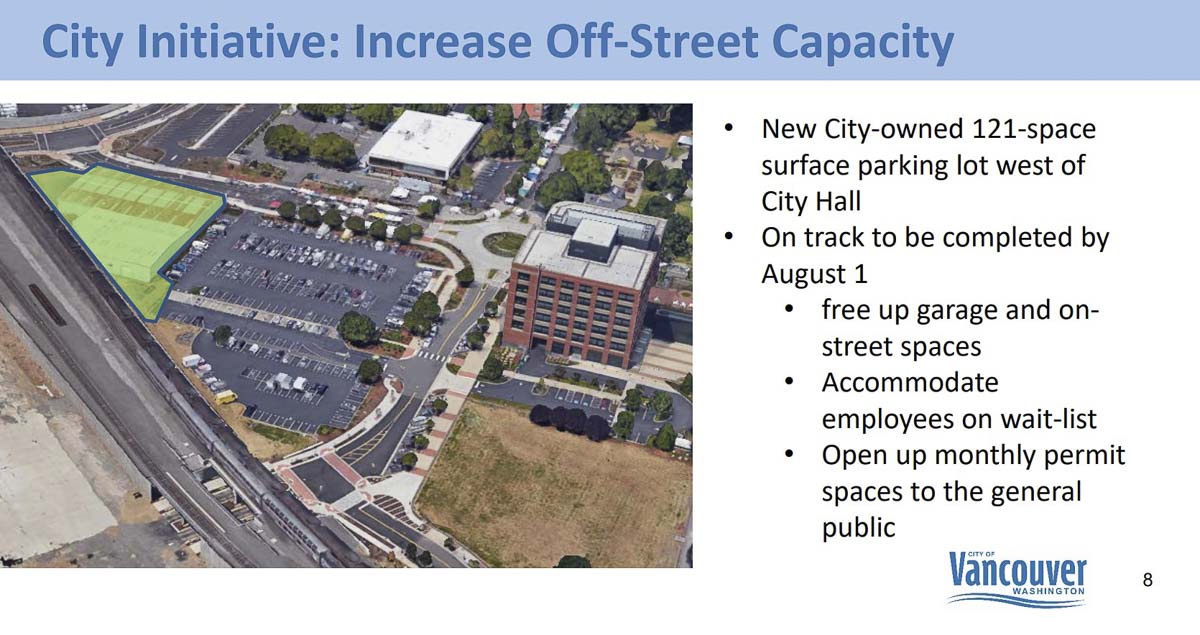
Raising public parking rates, Kaspan said, could incentivize more private parking companies to look into building garages in downtown Vancouver. One potential location could be the city-owned properties around the new Vancouver Waterfront. Eiken said there are between 5 and 6 acres that could be redeveloped. One proposal already being looked at is a 7-story parking structure at Waterfront Block 7 that could include 740 parking spaces and ground floor retail. Five hundred spaces have already been created through surface lots on blocks 5, 7, 10, and 11. If approved the new above-ground garage would begin construction late next year with a targeted opening date in Fall of 2021.
The Port of Vancouver is also looking into a possible parking garage at the north end of their Terminal One property. The proposed three-story building could bring as many as 900 public parking spots, or more. That number wasn’t included in the city’s projects, however, as it remains a concept only.
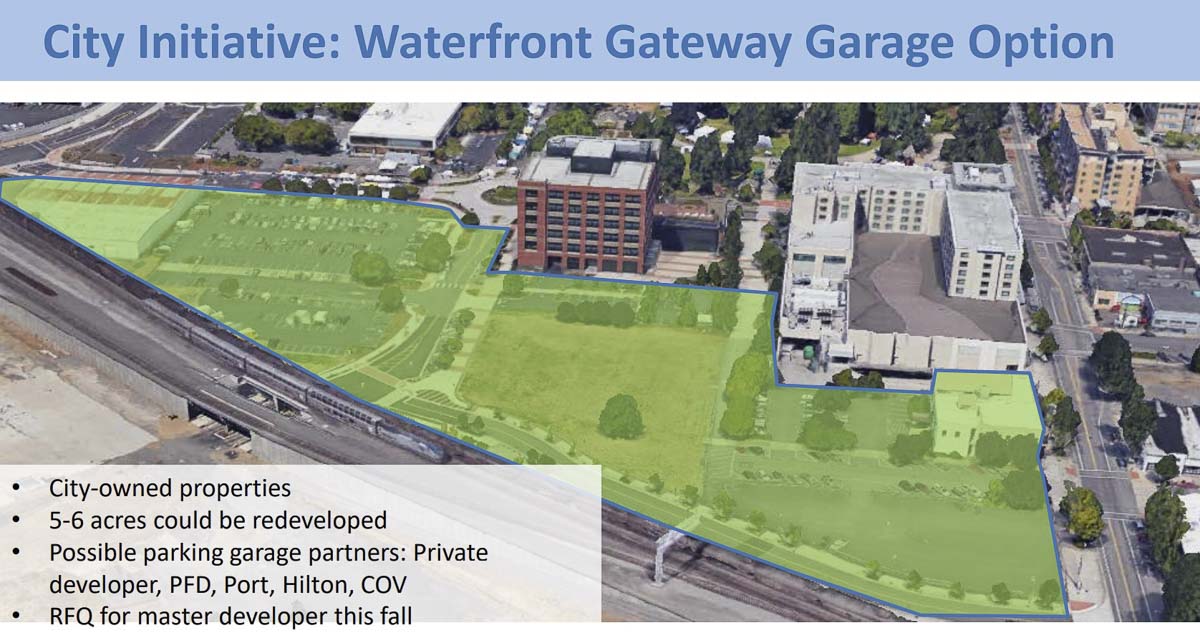
The city is also looking to potentially bring a surface parking lot to a vacant lot at 15th and Main Street. The 126 spaces there would be used to offset the loss of 176 parking spaces caused by the construction of two apartment buildings on the Academy property, expected to begin early next year. Eiken said city officials are also reaching out to those affected employees to make them aware of the Transportation Demand Management program, which provides incentives for employers and employees who use alternative methods to get to work downtown.
Eiken said they’re also rolling out new Wayfinder signage to help guide visitors to areas like the new waterfront, the civic center, and other locations where parking is usually more readily available.
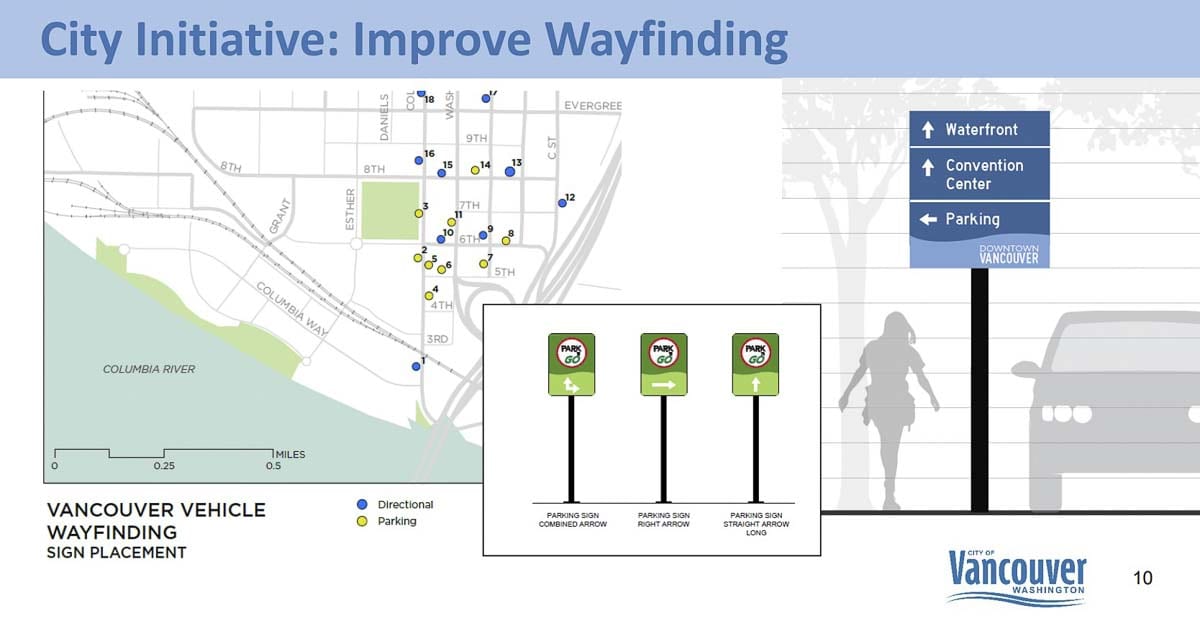
A balancing act
Several of the city council members said they appreciate the work being done to bring more parking options downtown, but wanted to ensure that there wouldn’t be “dead zones” or parking garages that “block out the skyline.”
Eiken said he’s well aware that there’s a delicate balance to making sure people coming downtown to work or play can get where they’re going, while looking to the future with better mass transit and safer ways to bike or walk downtown.
“We also know that surface parking is not the highest and best use for a downtown where property values are much higher than outside the downtown,” said Eiken. “We know there are improvements that need to be made to mobility and transit that give people options. Right now, I think if you were to ask people how would they get to work or to the downtown if they didn’t drive, many would be challenged to get from their neighborhood into the downtown.”
Eiken said there is also talk of helping smaller businesses make use of a company called Rethink Your Drive, or RYD. They have a fleet of four electric commuter vans companies can hire to shuttle employees to work. Those vans will soon be available to the general public to use for free outside of busy times.
“Our transportation planner indicates that we could subsidize ride trips for a set period of time, depending on what the potential cost per trip might be,” Eiken says. “So it sounds like there is some probably Destination Downtown funds that could be used for that on a trial basis to allow them to get acquainted with the system.”
The long-delayed Pay by Phone system for metered parking spots downtown is also expected to launch this Summer, Kaspan said. Pressed on why the system had been delayed for so long, he said the vendor wanted to wait to launch during the Summer when people tended to be downtown more often. Still the launch window was given only as “in the next few months.”
Eiken said the city is also hoping to speak with owners of private parking spaces to see if some reserved spots could be freed up for at least part of the day for public parking.
“If you look at some of the surface lots, you’ll see a reserve sign in the front of the stall and the space is empty,” he said. “I see that all over downtown.”
The final element is parking rates for city employees. They currently pay $50 a month, which is well below the standard rate for private sector employees. Eiken said some of the rate increases will need to be negotiated with unions representing some city employees, but the plan is to begin phasing in the rate hikes in the near future.
Overall Eiken estimates the city will gain slightly over 1,000 parking spots in the next few years, with a net gain of approximately 700 spots.
Financial picture
Kaspan said the city’s parking revenue has been increasing steadily, outpacing expenses for the first time in 2017. Last year they were able to cover the debt service for the first time on the Vancouvercenter parking structure, and anticipate that income will remain strong into the future.
“The revenue increases allow for future system investments such as more pay stations, lot improvements, shuttle service to satellite parking, and possibility to participate in garage construction,” said Kaspan, while noting that parking ticket revenue is actually declining. “So we’re getting revenue the way we prefer, which is through the pay stations and the meters and not through tickets.”




